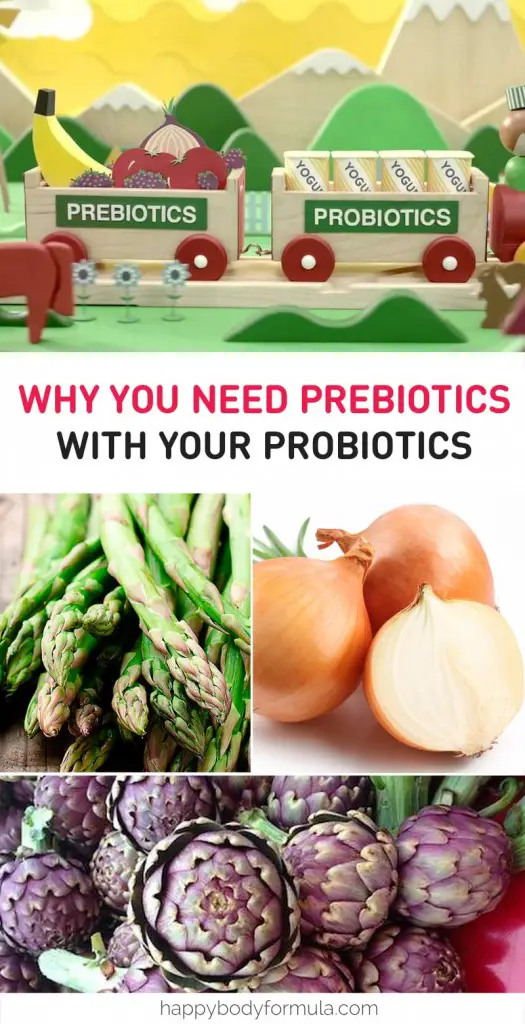If you’re interested in health and wellness, chances are, you know a thing or two about probiotics. These are foods or supplements with bacteria strains that help our gut stay strong, healthy and thriving.
Basically, we want to keep a baseline amount of good bacteria in the belly.
With this, we also need a variety of strains and have to place emphasis on maintaining all that gusty goodness.
Eating naturally fermented foods like yoghurt, kimchi, kefir, sauerkraut and miso or taking a quality strain of probiotics daily has a HUGE impact on well-being from disease-fighting properties to weight loss.
The gut is important stuff, my friends. Its health is not to be taken lightly. We know a little bit about probiotics now. So, what’s the deal with prebiotics?
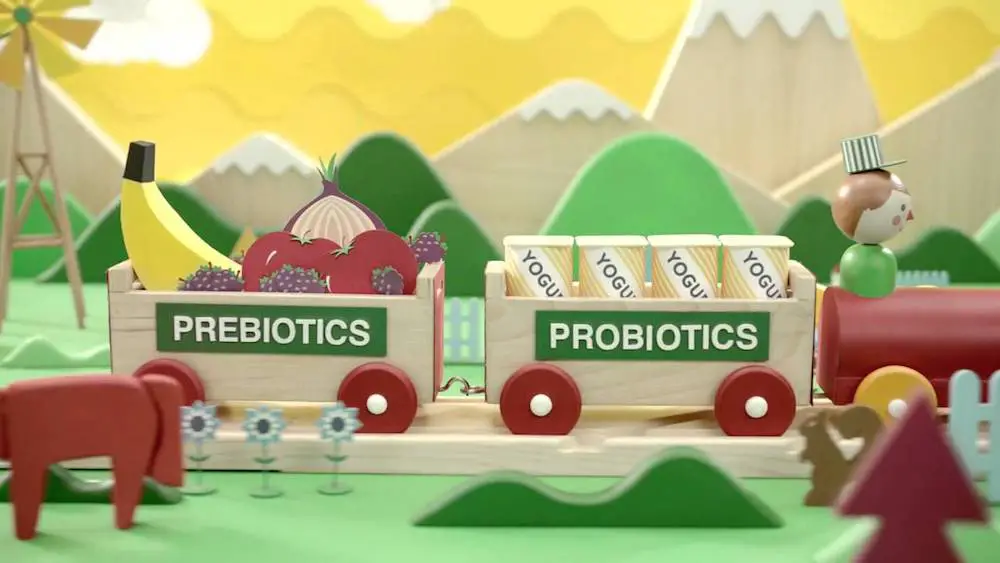
We’re going to cover the basics of why prebiotics are so important, why you might want to consider including more into your diet, which foods are naturally rich in prebiotics, and how they work in conjunction with probiotics – plus the bottom line on how they’re different – in this feature.
What are prebiotics?
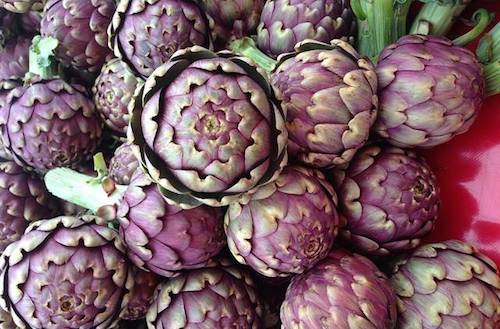
A prebiotic is a food ingredient that cannot be digested. Initially, this sounds pretty alarming, but they’re actually attributed to better digestion!
They behave the same way as a fibre compound would, actually – you know, what they always tell you to eat more of to get things running smoothly. Prebiotics promote the growth of microorganisms in the intestines like good bacteria.
Once they pass through the small intestine undigested, the prebiotics enter the large intestine where they are fermented be preexisting anaerobic bacteria. Here, it acts as fuel or nutrients for the bacteria in the gut. As long as that bacteria is good, we want to feed it!
This is why prebiotics are vital to supplement with if you’re taking in probiotics, whether in supplement form or with fermented foods.
The difference between a prebiotic and a probiotic: Probiotics produce beneficial bacteria while prebiotics provide some sustenance for that beneficial bacteria.
The benefits of prebiotics
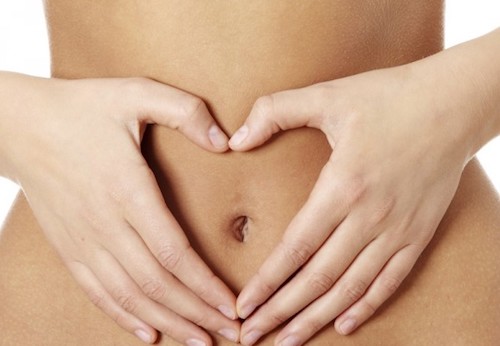
It comes down to the improvement of our gut bacteria including diversity and abundance, the interaction between pre- and probiotics, and how we can up the ante when we draw the connection between specific aspects of our health and the microbiome.
It’s interesting stuff, and there is quite a bit of promising research!
1. Digestion, digestion, digestion
Digestion is the root of all health. If your digestion is feeling good, chances are, a lot of other things are falling happily into place! Hippocrates said it all when he proclaimed, “All disease begins in the gut.”
Beyond disease, we can trace so much back to our gut flora and subsequent healthy digestion. Probiotics bring in that good bacteria that keeps our gut strong and its lining less permeable, so less vulnerable to outside forces.
What do prebiotics have to do with it?
First, when our bacteria begins to “munch” on the non-digestible fibres from prebiotic foods, they start to produce short-chain fatty acids. We love our fatty acids.
We get some butyric acid in the mix which helps the intestinal lining stay strong. This also encourages regulation of electrolyte levels including magnesium, calcium, sodium and water.
This is a delicate balance that’s essential to overall well-being!
2. Immune boosting benefits

Our gut also has a lot to do with immunity. Pathogenic bacteria is more likely to increase without a good foundation of bacteria in the gut, as our epithelial tissue is dependent on gut flora!
It won’t regenerate without an abundance of the stuff, so we have to make sure to keep nourishing our bacteria with the food it needs. Prebiotic foods change our flora for improvements in immunity.
The “prebiotic effect” is also associated with reduced risk of cancer-promoting enzymes due to its impacts on the immune system.
Finally, prebiotics and probiotics increase the body’s natural ability to absorb vitamins and minerals, so we can ensure that our nutrient-dense diet is truly feeding our immune system and beyond!
3. Positive stress response

Our hormones go a little cuckoo when we get stressed sometimes. Fortunately, many of us rebound pretty well. For some, though, chronic stress is wreaking havoc on hormonal health.
If your gut health is compromised, too, the stress response can be heavily weakened over time! Diet has a lot to do with this, and adding in prebiotic foods can offer up serious benefits.
We know that probiotics have a generally positive effect on stress and stress-related disorders like anxiety, depression and bipolar disorder. This study confirms that some types of prebiotics have similar impacts!
In adults who used a prebiotic, one of the most notable differences to confirm this idea was the decreased attention vigilance. Basically, the participants were less reactive to stress and could more easily focus on the positive rather than the negative.
In terms of our hormones, healthy gut flora can act as an adaptogen by making our bodies more resilient to stress overall, decreasing that initial release of cortisol and regulating it well even under stressful circumstances.
Lastly, it’s important to note that digestive disorders like IBS are linked to stress, so addressing gut health is very important in addressing autoimmunity and the stress response.
4. Bone health
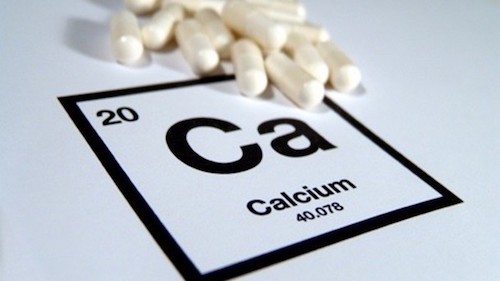
Prebiotics have the ability to make vitamins and minerals more available to the body for use, so our bones benefit big time from this. If you’re taking in a nutrient-dense diet but your digestion is still compromised, or your gut flora is weak, you won’t actually be absorbing all those healthy properties at all!
This is especially true for calcium, iron and magnesium with prebiotics, and that’s why they tell you that you’ve got to drink your milk.
Prebiotics can help prevent osteoporosis, increase bone density and keep your skeleton strong, warding against breaks, fractures and sprains.
5. Weight loss
Good gut health and prebiotic supplementation have been linked to better satiety, blood sugar regulation and energy homoeostasis. We all know that fibre is recommended for those who aim to eat for weight loss or weight maintenance.
Not only does it keep digestion smooth and happy, but it fills you up, so you’re less likely to go foraging for snacks in between meals. This applies to the indigestible fibrous material too!
Moreover, because prebiotics keep our hormones happy and our stress levels manageable, we’re less likely to be driven to hunger by those factors. One of the most common reasons for weight gain or weight loss resistance is unhealthy hormonal glands including adrenals, pituitary and thyroid.
Cortisol and ghrelin – the hunger hormone – might be released without our consent, and prebiotics can help get these guys in check.
Food sources of prebiotics
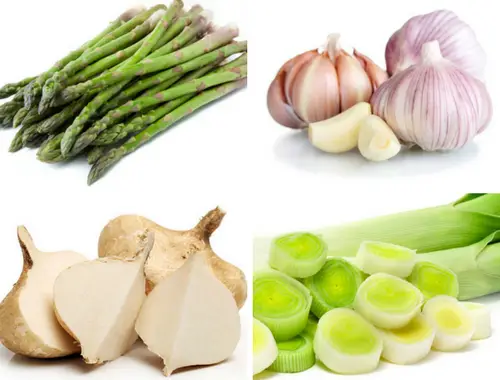
How can YOU get more prebiotics into your diet? If you’re working hard to ensure a happy, healthy gut with good integrity for bacteria to thrive by eating probiotic-rich foods, you absolutely want to ensure that you’re consuming quality sources of prebiotics as well!
These two work together beautifully. Many of these foods should be consumed raw, and none should be used in excess. Many prebiotic foods and raw veggies in general, can cause some tummy distress, so use with caution!
Otherwise, there are no harmful side effects. Here are some of the items you should add to your next shopping list:
- Green banana (slightly unripe) or green banana flour
- Chicory root
- Raw leeks
- Raw onions
- Raw garlic
- Sunchokes or Jerusalem artichokes
- Asparagus (preferably raw)
- Dandelion greens or dandelion root tea
- Raw jicama
Hopefully, we’ve helped you make more sense of why you need both probiotics and prebiotics. What’s your favorite prebiotic food to eat?
Let us know in the comments below! Share this post on Pinterest from here!
Music, mountains, dogs, travel, food and friends.

